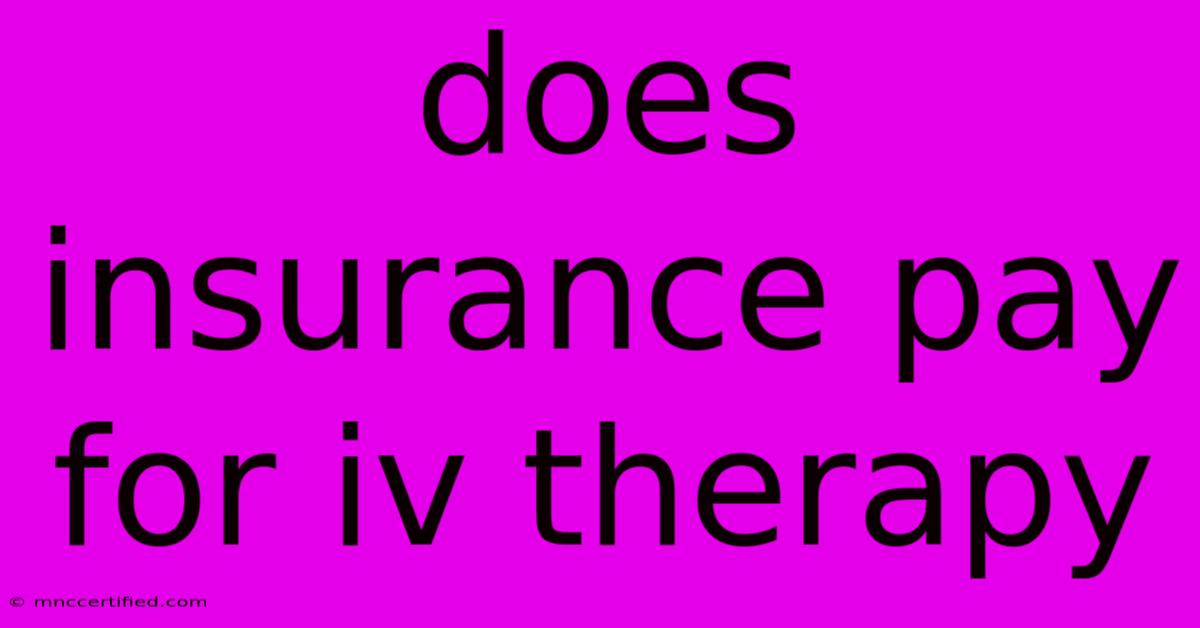Does Insurance Pay For Iv Therapy

Table of Contents
Does Insurance Pay for IV Therapy? A Comprehensive Guide
IV therapy, the administration of fluids and medications directly into a vein, is increasingly popular for hydration, nutrient replenishment, and treatment of various conditions. But a common question arises: does insurance pay for IV therapy? The answer, unfortunately, isn't a simple yes or no. It depends on several crucial factors. This comprehensive guide will break down everything you need to know to navigate the insurance landscape of IV therapy.
Factors Influencing Insurance Coverage for IV Therapy
Several factors determine whether your insurance company will cover IV therapy costs. These include:
-
Your Insurance Plan: This is the most critical factor. Different insurance plans have varying levels of coverage for IV therapy. Some plans may cover it completely if medically necessary, while others may offer partial coverage or no coverage at all. Check your policy documents carefully or contact your insurance provider directly to understand your specific benefits and limitations. Look for key terms like "inpatient," "outpatient," and "medically necessary."
-
Medical Necessity: Insurance companies generally only cover IV therapy deemed medically necessary by a licensed healthcare professional. This means your doctor must justify the need for IV therapy based on your diagnosed condition. A simple desire for wellness IV drips may not qualify for coverage. A proper diagnosis and prescription are essential.
-
Type of IV Therapy: The type of IV therapy significantly impacts coverage. IV therapy for treating a medical condition like dehydration due to illness, or administering essential nutrients to someone with a diagnosed deficiency, is more likely to be covered than IV drips offered at wellness clinics for general wellness purposes.
-
Location of Treatment: Where you receive IV therapy also matters. Treatment at a hospital or doctor's office is more likely to be covered than treatment at a standalone IV hydration clinic or spa. This relates to the "medical necessity" aspect; treatment within a medical setting often carries more weight with insurance companies.
-
Pre-authorization: Some insurance plans require pre-authorization before IV therapy is administered. This means your doctor must obtain approval from your insurance company before the procedure. Failing to get pre-authorization could result in significantly higher out-of-pocket costs. Always check with your insurance provider beforehand.
What Types of IV Therapy Might Be Covered?
Insurance is more likely to cover IV therapy administered for the treatment of specific medical conditions, such as:
- Severe Dehydration: Due to illness, vomiting, diarrhea, or other causes.
- Nutrient Deficiencies: Treatment for deficiencies in vitamins, minerals, or electrolytes.
- Medication Administration: When medication needs to be administered intravenously for effective treatment.
- Post-Surgical Hydration: Supporting recovery after surgery.
- Treatment of Infections: Administering antibiotics or other medications intravenously.
What Types of IV Therapy Might Not Be Covered?
Insurance is less likely to cover IV therapy performed for:
- Wellness or preventative purposes: "Boosting immunity" or general wellness treatments are often considered elective and not medically necessary.
- Cosmetic purposes: IV therapy for skin rejuvenation or weight loss isn't usually covered.
- Treatments offered at non-medical facilities: Spas or wellness centers offering IV drips may not be covered by insurance.
How to Maximize Your Chances of Insurance Coverage
- Discuss with your doctor: Clearly communicate your intention to seek IV therapy and ask your doctor if they believe it's medically necessary and if they can bill your insurance company.
- Check your insurance policy: Thoroughly review your plan's benefits and coverage details. Understand your deductible, co-pay, and coinsurance.
- Obtain pre-authorization if necessary: Contact your insurance provider to determine if pre-authorization is required.
- Choose an in-network provider: Using in-network healthcare providers can often result in lower out-of-pocket costs.
- Keep detailed records: Maintain records of all medical records, bills, and communication with your insurance company.
Conclusion: Navigating the Insurance Maze
Determining whether your insurance will pay for IV therapy requires proactive research and communication. Understanding the factors influencing coverage, the types of IV therapy typically covered, and taking the necessary steps to maximize your chances of coverage are crucial. Always contact your insurance provider directly to confirm coverage before undergoing any treatment. This proactive approach will help you avoid unexpected medical bills and ensure you receive the necessary care while managing your healthcare costs effectively.

Thank you for visiting our website wich cover about Does Insurance Pay For Iv Therapy. We hope the information provided has been useful to you. Feel free to contact us if you have any questions or need further assistance. See you next time and dont miss to bookmark.
Featured Posts
-
Do Psychiatrists Accept Insurance
Nov 19, 2024
-
Spain Portugal Secure Quarterfinal Berths
Nov 19, 2024
-
Does Transcend Hrt Take Insurance
Nov 19, 2024
-
Australia Vs Pakistan T20 Stoinis Unbeaten 61
Nov 19, 2024
-
Dune Prophecy Review A Different Sci Fi
Nov 19, 2024